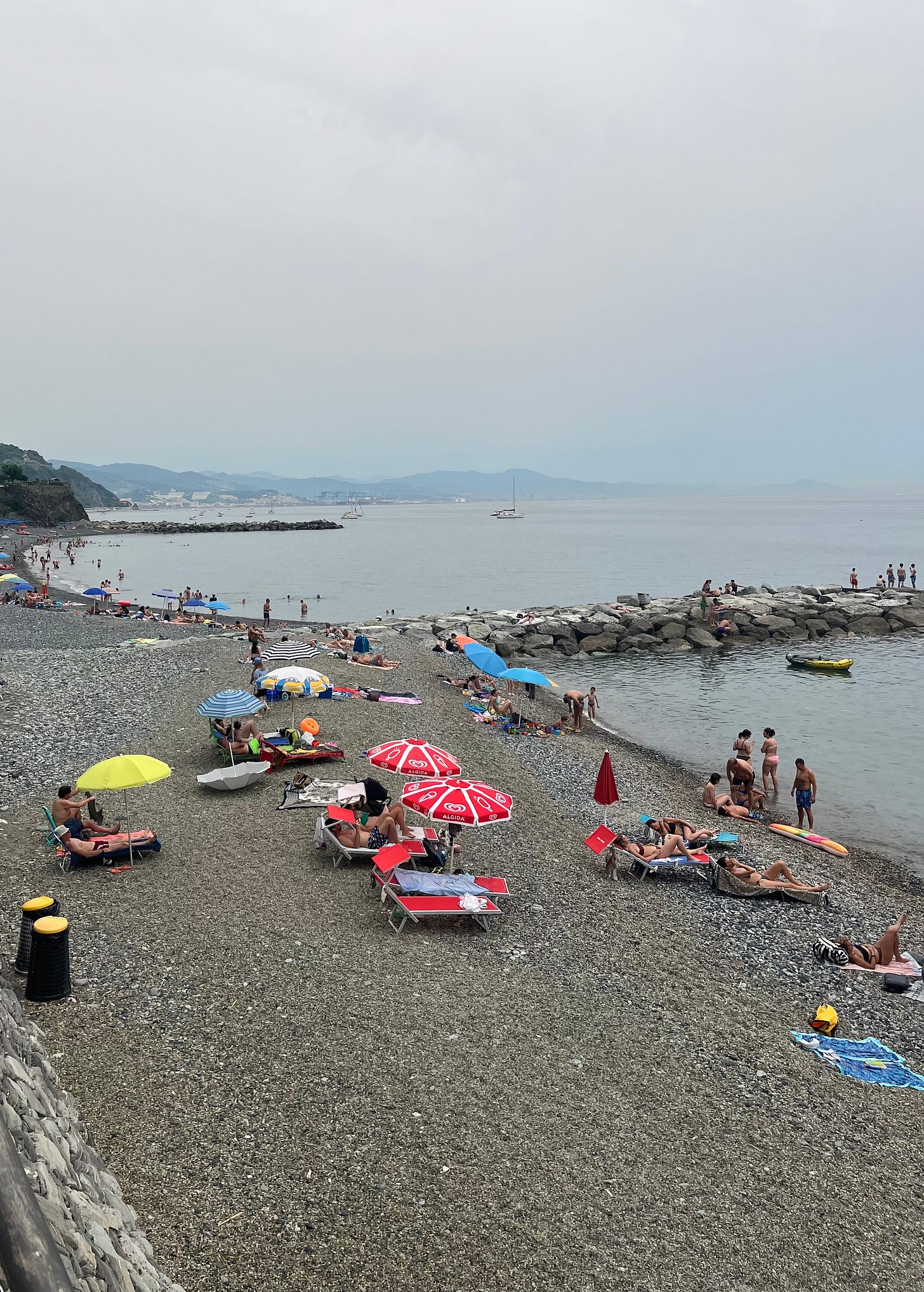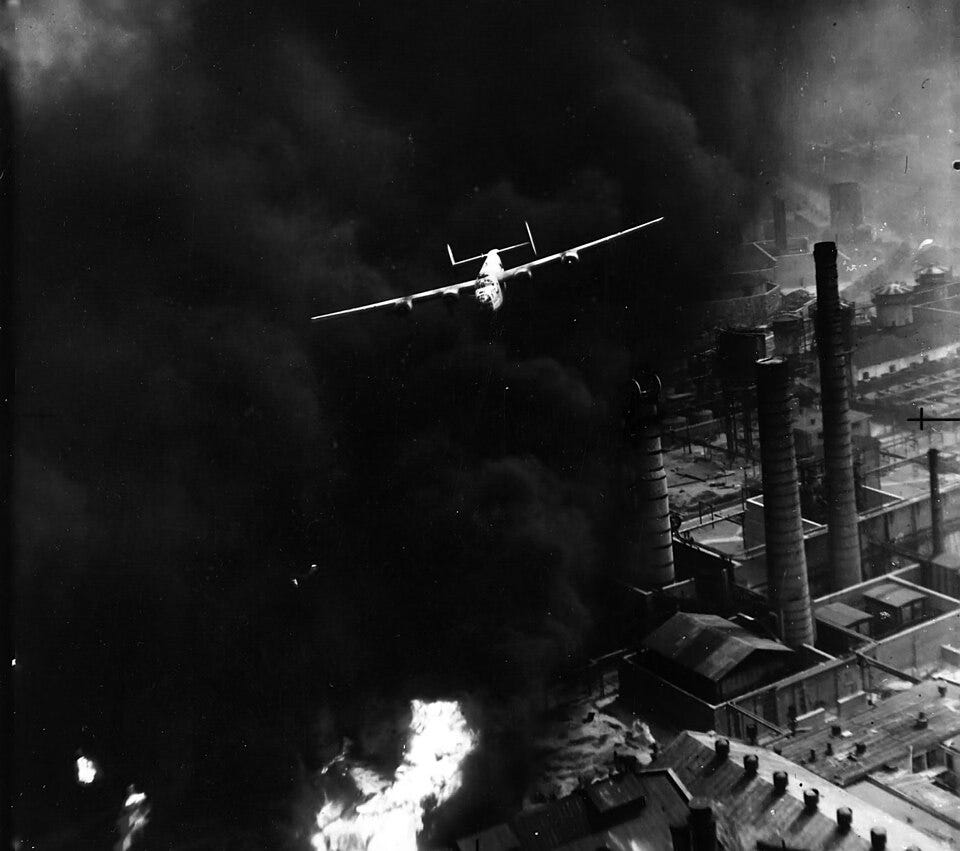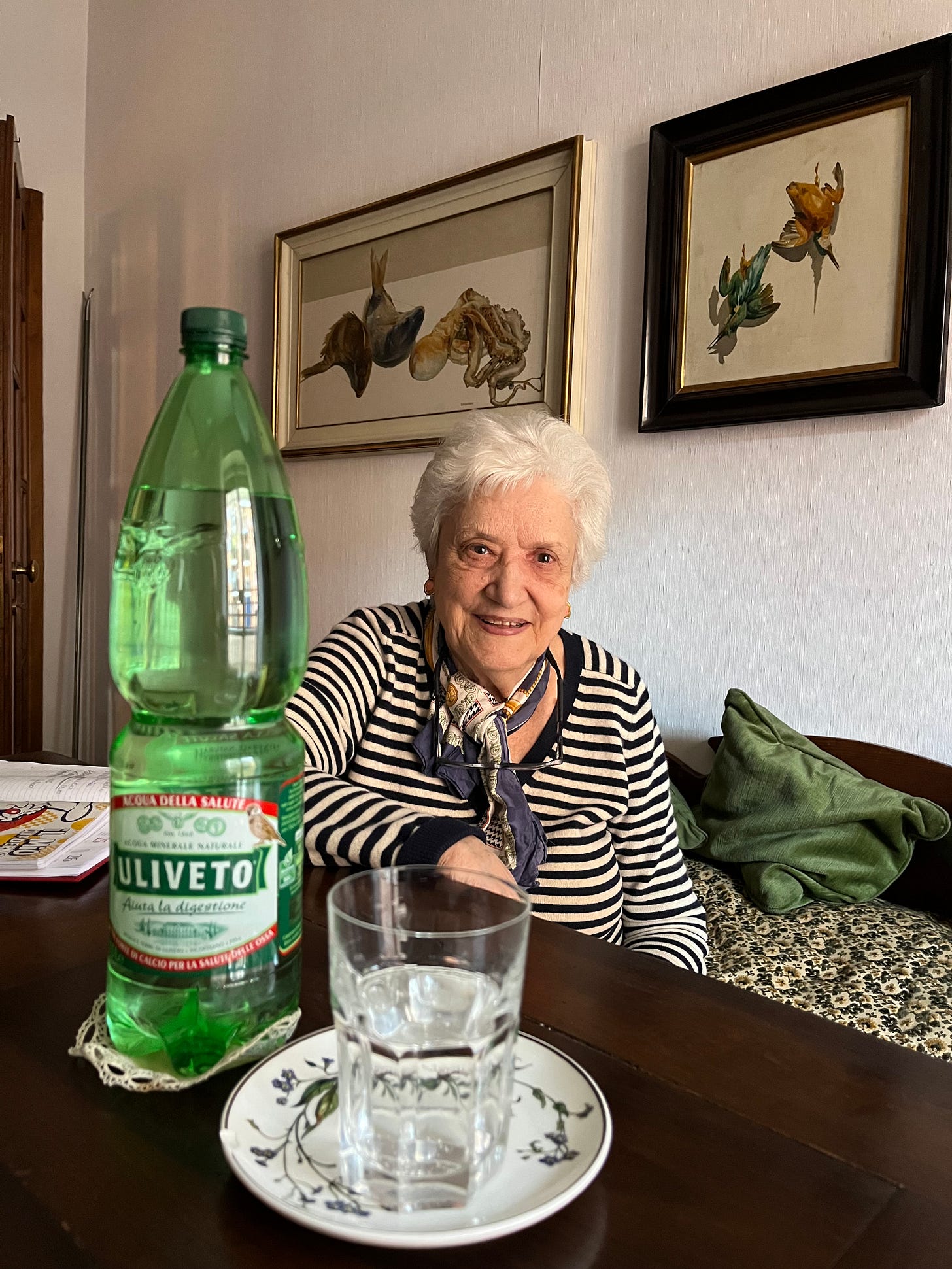Genoa, Italy: Where A School Girl Plays On The Beach Until . . .
Giuliana is a lesson in perseverance. The Milan resident reflects on a childhood spent in the historic port city, where her courteous English grew. World War II is a distant memory for many, but . . .
Sans sand: a sun-starved seaside, six miles (10 kilometers) to the west of Genoa. Pebbles more typically grace beaches in the region of Liguria. Italians scatter at sight of raindrops, but overcast skies will do on weekends (photo/David Scott).
At 87, Giuliana is ever proper on a vivid blue Friday when Italy observes its liberation from Nazi Germany—today.
In her modest yet tastefully furnished Milan apartment, everything has to be done just right, from cordial introductions to farewells, when courteous body language and apt grammar are as fundamental as a Japanese bowing in respect.
But when a spilt glass of mineral water runs across her varnished hardwood dining table—the one without a single scratch—it’s no big deal.
“Stay—I’ll go get a dish towel,” she says in refined English. Giuliana (pronounced Julie-ahna) calmly rises in her conservative blue dress and heads steadily down the hall in sturdy black heels, the kind in-vogue Milanese would forsake for something a bit more heightened.
But she’s got style, with a fleur-des-lis silk scarf hugging her neck. “I sometimes get cold,” she explains. Everything perfectly fits, including her schedule. She teaches a catechism class in the afternoon. “No, it’s not the ascension—that comes later,” she corrects an American. “Easter is the resurrection.”
Afterward, the retired teacher has other duties. She’s got her daily afternoon stroll with Ana, a hard-working Romanian who long ago mastered Italian, in small part due to Giuliana’s multi-generation family. A widow, the octogenarian is the mother of three children and five strapping grandsons, all of whom, in one way or the other, call on her.
She’s not quite to the kitchen yet.
“Put your bandana away,” she says serenely, passing a series of gold-corniced oil paintings. “It’s just water.”
She’s not in a hurry.
Giuliana has seen worse.
Far worse.
In Genoa, where she was raised.
That day, when the American planes swooped in with their machine guns and their bombs, turning the port cityscape into putrid fumes.
An American B-24 in action (Wikipedia photo)
“The Americans, you know, liberated Italy. They were our saviors.”
Saviors from a nightmare that started with dictator Benito Mussolini, whose corpse was stoned to a pulp in Milan 80 years ago on Monday.
Giuliana’s expression darkens, as she shifts to Italian, accenting sentences like a mom reprimanding a son for a grave error. To this day, she says she feels “distress” over his name.
“He was a disgrace.”
***
Giuliana in Genoa during World War II: Children at play on the seaside.
The sweet smell of Liguria: Spring flowers liven the Ligurian landscape, where flashes of tropical-like flora charm wanderers along a winding promenade leading to nearby Genoa (photo/David Scott).
On a spring day in 1944, the petite Italian school girl saw something shiny on Genoa’s beach.
She kneeled and tapped the glinting object peeking from pebbles. Maybe it was a toy.
Her life changed.
The baseball-sized UXB—an unexploded bomb—detonated, spraying fragments over her face. Blood trickled down her cheek bones, and she couldn’t see out of one eye.
“Mamma!”
The seven-year-old would be scarred for life, her mom knew. How would she ever be able to marry and have children, let alone catch a wink from a young man? Allied planes had relentlessly strafed the port city, scarring its industry and ancient streets. South Italy had fallen to U.S. troops in 1943, but the Germans refused to clear out northward.
It was Giuliana’s face that was now scarred, seen through a four-inch-long gash mark on her forehead, powder burns below her left eye, and a right eye that had healed poorly.
She persisted as a teen, earning top marks at high school. It was obvious, from a cross-street glance, she was a good-looking young woman. Blessed with thick chestnut brown hair tied neatly into a bun, the 18-year-old moved swiftly in her black heels and cut a cute figure in knee-length summer dresses, striding determinedly to catch the single-car tram that would rattle its way uphill on sultry July evenings, homeward bound. Sea breeze would occasionally sneak through trolley windows, cooling her head. How she adored Genoa, where her dad worked as an engineer.
If only her visage were . . . better. When would the boys ever come knocking?
When she turned 23, Giuliana passed a high-level exam on English, a first love of hers along with French. If she could just master all those tricky cases, that bedeviling dative and such, then why not German, too?
Why, maybe she could even become a teacher, she giggled privately.
English, it turned out, would come in handy in an industrial city called Cleveland, in the state of Ohio. Where was this place?
Her father came home one evening with astounding news: A plastic surgeon in the USA had learned of her childhood misfortune and had offered to operate on her, pro bono.
“I just knew it,” she exclaimed to herself, suppressing jumpy nerves. The Americans were such a good people, even valiant, she and her family always said. Those soldiers, on that glorious liberation day in 1945, had showered the streets of downtown Genoa with chocolate bars—Hershey’s, that’s what it was called. Oh, what a spectacle, a little like carnevale but even wilder. She’d seen Italian women get swept off their feet, high heels and all, when those squeaky tanks and speedy jeeps rolled into town. Grubby young Army boys swigging wine from jugs and tapping packs of Camel against their web-encased helmets—and they could really kiss, by the looks of it. Didn’t a few of those gals even get married to GIs?
***
Secret swimming hole: Young Genovese have a craggy beach to themselves. The promenade provides no access to the staircase. Only they know the way. Giant green girders loom from Genoa’s port, background (photo/David Scott).
“Princess, it’s me, your mom. How are you feeling, my precious?” Resting on a bed at the hospital, she felt like a phantom after a fist-fight. An obscenely big bandage covered her forehead and, even worse, purple and blue colored her facial skin.
“The doctor says in just a couple weeks, the bruises will completely fade, isn’t that great? He seems like such a very nice man and so capable. You mustn’t worry.”
In stepped Dr. Anderson of the Cleveland Clinic Hospital. “My dear, let’s get rid of those bandages and get you some fresh air, what do you say?”
Shuffling back, the surgeon looked as if he was concealing emotion, putting an index finger to his chin.
Still stoic, he passed her a hand mirror. She trembled.
And then they streamed. At first a trickle, unburdened rivulets cascaded down her cheeks bones. The surgeon, as unreal as it seemed, had vanquished 16 years of pent-up anguish.
“If you’re not satisfied, come back and I’ll do it again,” Dr. Anderson said.
Giuliana, who can’t recall his first name, says she is eternally grateful. “He didn’t take a cent. He was a pearl.”
That fortnight in Cleveland, she gingerly explored a big bustling city with trams just as in Genoa. It was the America she knew from James Stewart movies. How funny they spoke, compared to her British teacher, but she understood most of what they said and vice versa, fancy that.
On the day the bruises faded for good, Giuliana felt like a Renaissance princess.
And later that summer in Genoa, the young men came knocking.
-30-
Giuliana, the courteous English speaker from Genoa. Only an up-close look reveals traces of her forehead scar (photo/David Scott).
-30-









Giuliana is a remarkable woman. I’m thankful to get to read her story.